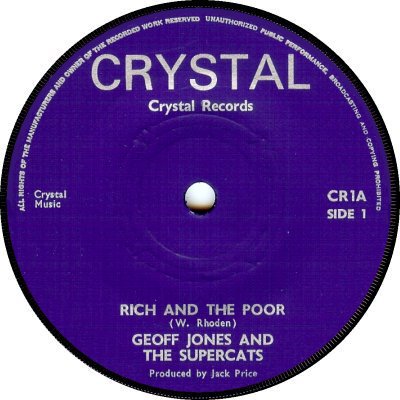
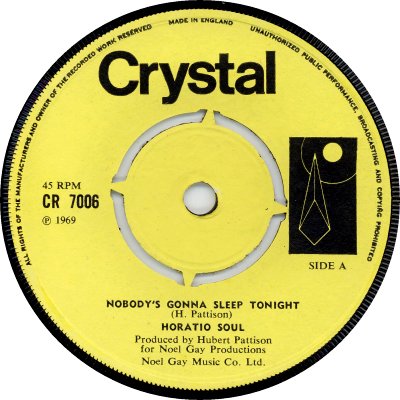
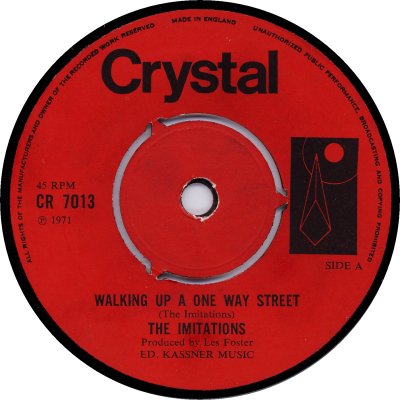
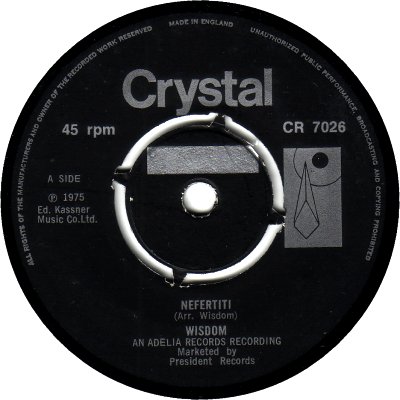
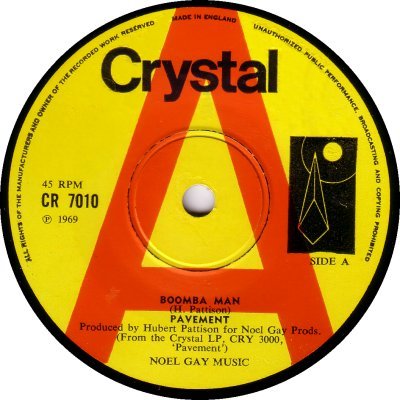
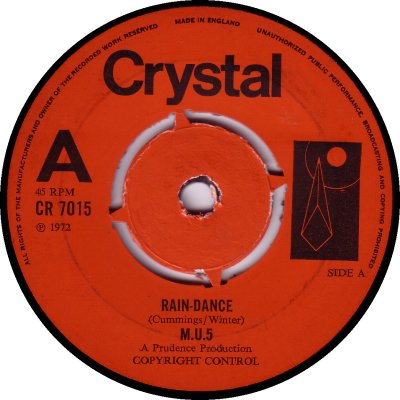
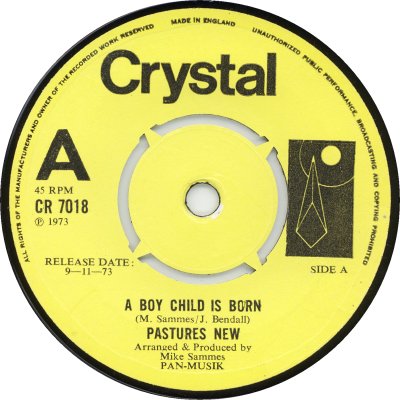
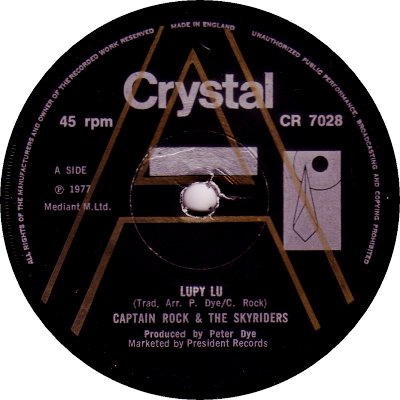
Crystal Records was started up in 1968 by songwriter / engineer / producer Jack Price and Jean Domminney. It seems to have acted as a production company initially: Price supplied Philips with three singles and an album, 'Rock Steady Hits Of 1969' in 1968-69. The singles, 'Save The Last Dance For Me' b/w 'Will You Still Love Me Tomorrow' by D.D. Dennis (MF-1064; 11/68), 'Let The Red Wine Flow' b/w 'I Need Help' by Pat Rhoden (MF-1072; 1/69), and 'From The Very First Time' b/w 'There's A Place' by Ken Jonnart (MF-1118; 7/69) were issued on Mercury, the album on Fontana (SFL-13116). 'Record Retailer' of the 15th of January 1969 broke the news that Crystal, which it said was based in Birmingham, had been acquired by President Records (q.v.), and was now part of the President group - the deal doesn't seem to have affected Price's agreement with Philips, as the album and the Ken Jonnart single post-date it. The first Crystal production to be released on the President label was to be 'With These Hands' by Mark Wayne, backed with Geoff Jones's 'Rich And The Poor' (PT-233; 1/69). The same single can be found on a blue Crystal Records label as CR-1, with Jones's track as the 'A' side (1). There's no year on the Crystal record: it may be a reissue and flipping of the President single, but its appearance suggests that it may date from before the acquisition by President and that it was the President version which was the flip / reissue. I've put it in pole position on the grounds that it looks early and a reissue on Crystal would be more likely to have one of that company's CR-7000 catalogue numbers.
President gave Crystal its own identity in June 1969; an advert for the first Crystal single of the President era, 'Kilimanjaro' b/w 'Lil Oh Me' by John Sands (CR-7001) appeared in 'RR' of the 4th of June and gave the company's address as 1, Westbourne Gardens. The following week 'RR' of the 11th of June noted that Crystal was to be launched on Friday 13th, and that it was to be an outlet for Jack Price's productions. President would handle promotion, and distribution would be through Selecta. Nine more singles and more than a dozen albums duly appeared; the singles tended toward Rock Steady and MOR vocal material, while the albums were mostly of organ music. Then, starting in the summer of 1970, there came a twelve-month lull.
1971 saw Crystal getting a new lease of life: 'RR' of the 17th of June announced that it was to be relaunched in the autumn as a Reggae / R&B / Soul label, under Jack Price and John Hofstedt. By the look of its products, however, the revived Crystal appears to have offered the same kind of mixed fare as before: mainly Reggae and MOR vocal, with organ music filling the LP listings. In addition, the revival seems to have run out of steam fairly quickly, on the singles front at least - half-a-dozen were issued during the autumn of 1971 and the spring of 1972, but the next came on November 1972 and the one after that a year later. Price was heavily involved in the Reggae-only Sioux label (q.v.) from late 1971 into earlyish 1973, so his attention may perhaps have been focused on that.
Crystal lay dormant throughout 1974; then in the spring of 1975 it was taken off the shelf, dusted down and put to work again. This time around it appears to have featured Soul / Disco material; there were no Jack Price productions, which suggests that his involvement may have been either minimal or even lacking altogether. In this form it kept going until early 1977, after which there was another gap, this time of around eighteen months. Crystal then resurfaced as a Pop label; it put out five singles between the middle of 1977 and the middle of 1978 before going back into hibernation. It emerged briefly in 1981 and 1986, on both occasions issuing a solitary single, but they appear to have been its final flings.
Crystal's label design stayed basically the same throughout its time with President, but it came in three different colour schemes: black-on-yellow to CR-1012 (2); black-on-red for CRs 7013 to 7016 (3); yellow again for CRs 7017 and 7018; then finally, for the 1975 revival, silver-on-black (4). A silver bar was added above the spindle hole with the advent of the black labels, but it disappeared in 1977, CR-7029 being the last single to feature it. Promo copies were marked with a big solid red 'A' (5) up to and including CR-7014; issue copies of 7013 and 7014 had red labels, promos yellow with the red 'A'. Promo copies of CRs 7015 to 7018 had a much smaller black 'A' on them (6, 7). For CRs 7020 onwards the large 'A' returned, this time hollow and in gold (8), though promo copies of 7031 had a small silver 'A' at four o'clock instead. Distribution was by members of the BIRD group, including Lugton and H. R. Taylor, with Selecta contributing until 1972 and Enterprise joining in after President bought that company, in 1974. The manufacturer remains to be established, but as President acquired a 50% share in British Homophone in 1971 and later took it over entirely it seems reasonable to guess that a lot of the later pressings would have been done by that firm. Crystal never enjoyed any hits, but at various times it had records by past-hit-makers The Cats and Craig Douglas in its catalogue. Thanks to Robert Bowes for the first scan.
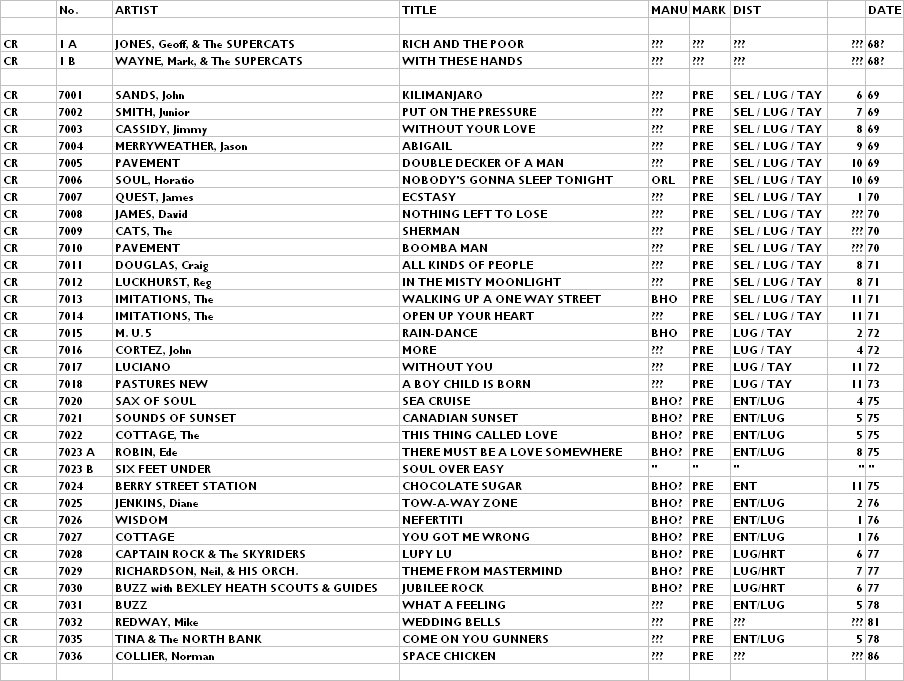


Copyright 2006 Robert Lyons.

